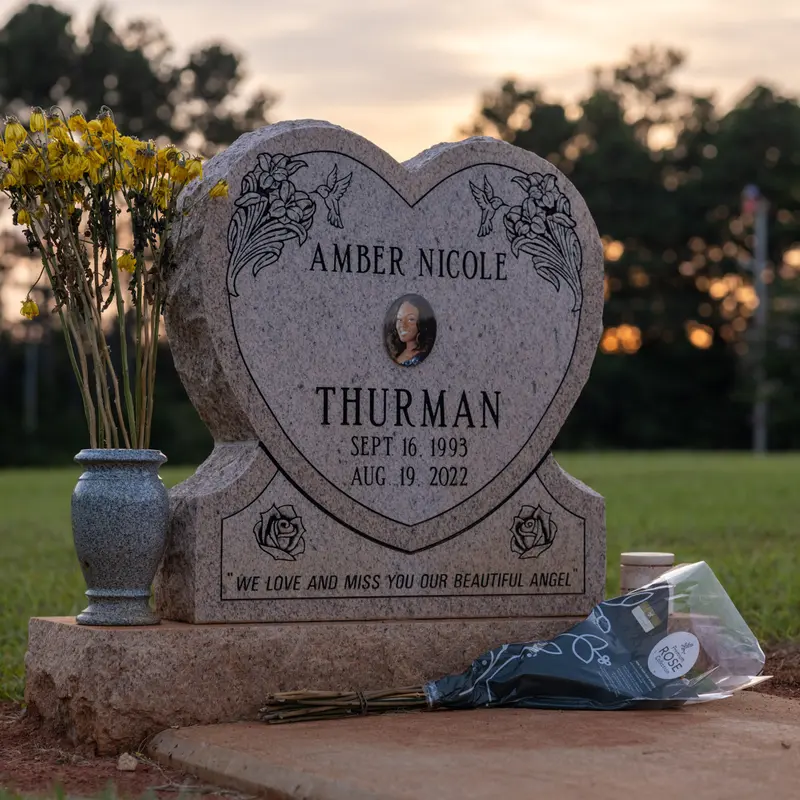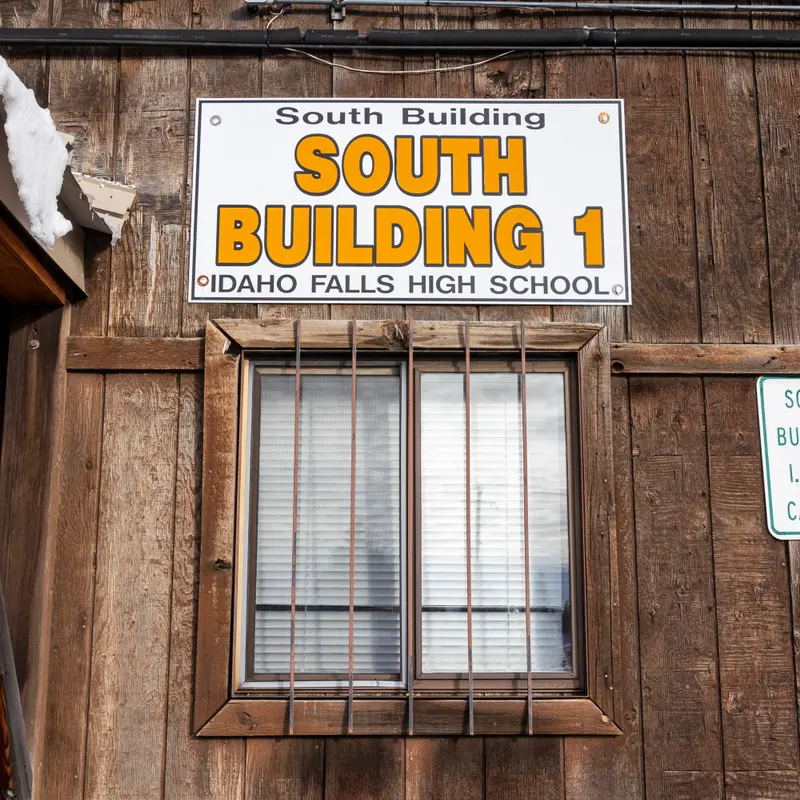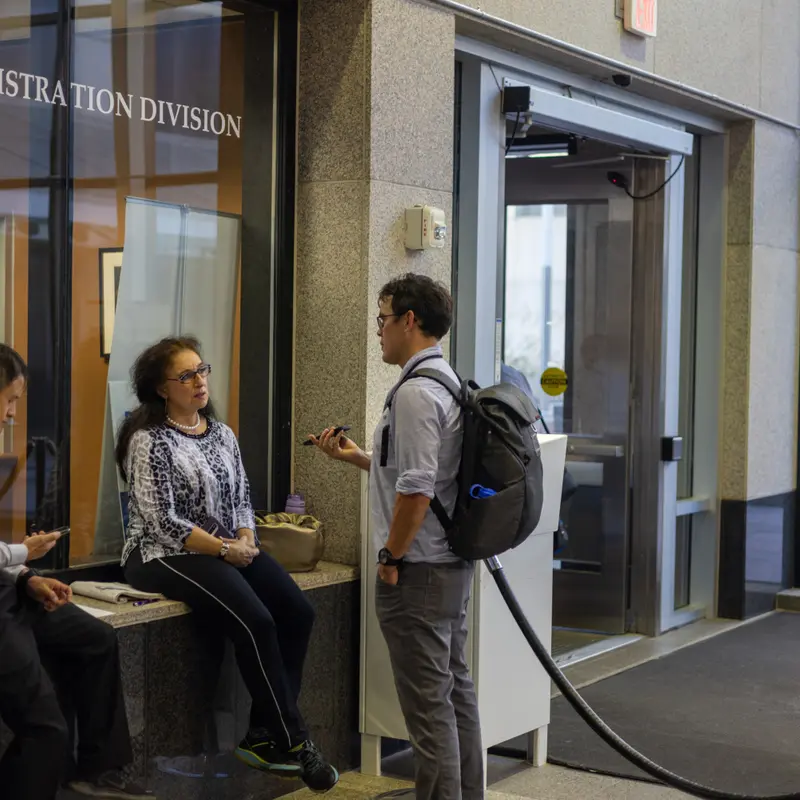A voting rights advocate has compiled a list of challenged ballots in this race; you can check whether your vote is among them here. If it is, reporter Doug Bock Clark is interested in hearing your story. Email him at [email protected] and briefly describe your experience and why you believe you were challenged. Also, please reach out if you have any information about the North Carolina Supreme Court or state court system that you think we should know. Clark can be reached securely via phone or on Signal at 678-243-0784. If you’re concerned about confidentiality, check out our advice on the most secure ways to share tips.
North Carolina Supreme Court Candidate Wants Military Absentee Votes Tossed. Years Earlier, That’s How He Voted.
The move gives the court time to consider a challenge by Republican Jefferson Griffin, who has cited debunked legal theories in his previous failed attempts to block Justice Allison Riggs’ reelection.
As a member of the Army National Guard in 2019 and 2020, Jefferson Griffin voted in North Carolina elections using military absentee ballots.
Now, as he seeks to overturn the results of a state Supreme Court election that went against him, Griffin is asking that same court to disqualify the votes of around 5,500 people who voted in the same manner as he had.
Since Democrat Allison Riggs won reelection to the state’s highest court last year by 734 votes, Griffin, now a Republican judge on the state’s Court of Appeals, has repeatedly tried to nullify her victory. Last week, the Republican majority on the state Supreme Court temporarily blocked the certification of Riggs’ win after Griffin filed a legal petition arguing that the election should be awarded to him.
In a briefing, Griffin’s lawyers argued that ballots cast by overseas and military voters should not be counted if they did not also provide photo identification, such as a photocopy of a driver’s license. His position contradicts that of the state election board, which had issued a rule before the election stating that such voters did not have to provide an ID.
Griffin’s use of these military ballots, which ProPublica confirmed using publicly available voting data and documents obtained via an open records request, has not been previously reported.
Two of Griffin’s absentee ballot requests came while he was deployed as a captain and a judge advocate general in the North Carolina Army National Guard. They were covered by a federal law called the Uniformed and Overseas Citizens Absentee Voting Act, more commonly known as UOCAVA.
Good journalism makes a difference:
Our nonprofit, independent newsroom has one job: to hold the powerful to account. Here’s how our investigations are spurring real world change:

Texas lawmakers pushed for new exceptions to the state’s strict abortion ban after we reported on the deaths of pregnant women whose miscarriages went untreated.

The Supreme Court created its first-ever code of conduct after we reported that justices repeatedly failed to disclose gifts and travel from the ultrawealthy.

The Idaho Legislature approved $2 billion for school repairs after we revealed just how poor the conditions were in the state’s crumbling schools.

The EPA proposed a ban on the toxic pesticide acephate after we highlighted the agency’s controversial finding that the bug killer doesn’t harm the developing brains of children.

Support ProPublica’s investigative reporting today.
We’re trying something new. Was it helpful?
In August 2019, for a municipal election, Griffin requested an absentee ballot, checking a box attesting that he was a “Member of the Uniformed Services or Merchant Marine on active duty and currently absent from county of residence.” Griffin listed his address as Fort Bliss, Texas, and the North Carolina Army National Guard’s 30th Armored Brigade Combat Team.
In January 2020, Griffin made a similar absentee ballot request for the March 2020 primary election, again checking a box that he was “on active duty in the Uniformed Services.”
At that time, North Carolina did not have a law in force requiring photo ID to be provided for in-person or absentee voters. (Though passed in 2018, the law did not take effect until late 2023.)
ProPublica sent Griffin a list of detailed questions, to which he replied: “I am not allowed to comment on pending litigation. It would be a violation of our NC Code of Judicial Conduct for me to do so.”
Embry Owen, the campaign manager for Riggs, criticized Griffin’s stance in the litigation. “Active-duty members of the military who are serving our country overseas count on their rights under UOCAVA to vote and make their voice heard. The same is true for members of the foreign service and missionaries in the field,” Owen said. “Any attempt to silence these voters is a shame on North Carolina’s democracy.”
As part of his legal fight, Griffin is challenging several categories of ballots, including over 60,000 that are missing driver’s license or Social Security data. But his theory that such information is necessary to legally vote has been repeatedly dismissed by the state election board, a federal judge appointed by President Donald Trump and even a right-wing activist who originally pushed it. In a virtual meeting, the activist called it “voter suppression” and said he was “100%” certain it would fail in court, as ProPublica has reported.
However, the issue of the 5,500 UOCAVA ballots has become increasingly important because Griffin has prioritized them in his latest legal briefing, asking the state Supreme Court to consider them first and, if nullifying those votes proves determinative, hand the election to him.
“In the Supreme Court contest, 5,509 such ballots were unlawfully cast,” Griffin’s lawyers wrote in their brief. “Judge Griffin anticipates that, if these unlawful ballots are excluded, he will win the election.”
Griffin is only trying to disqualify UOCAVA ballots in heavily Democratic counties, ignoring ballots from Republican areas, a ProPublica review of the contested ballots found. A data analysis by independent journalist Bryan Anderson found that Democratic ballots were disproportionately targeted, with Democrats being almost five times as likely as Republicans to have their ballots questioned by Griffin, though there are roughly equal numbers of Democrats and Republicans in North Carolina.
“Judge Griffin’s targeting of military and overseas voters from four heavily Democratic counties lays plain his goal: toss votes to retroactively win an election he already lost,” Owen said.
Griffin’s lawyers have argued to the state Supreme Court that since North Carolina law requires in-person voters to show a photo ID, UOCAVA voters should have to as well, such as by providing a picture of their driver’s license.
However, the state board of elections has repeatedly ruled that UOCAVA voters are not required to do so. When striking down Griffin’s challenges to the election results in December, the bipartisan panel unanimously rejected Griffin’s assertion that UOCAVA ballots submitted without photo IDs were unlawful, though it split along partisan lines for other challenges he made.
“We are not at liberty to change the election rules as they are established,” said Stacy Eggers IV, a Republican member of the board, when voting to reject Griffin’s challenges. “We have previously adopted a rule that says military and overseas voters are not required to show a voter ID” and “unless a court says otherwise, I’d find that we’re bound by that rule.”
Griffin has gone to extraordinary lengths to have this matter heard by the state Supreme Court, which has a Republican majority, filing his petition directly to the high court instead of working through lower courts first, as is the standard process laid out in state law. ProPublica has reported that the court’s Republican chief justice, Paul Newby, has been described by Griffin as a “good friend and mentor,” and most of the spouses of the Republican justices have donated to Griffin’s most recent or previous campaigns.
UOCAVA ballots are the primary method of voting for American service members stationed away from home and for other Americans living overseas. Voters request an absentee ballot by submitting the Federal Post Card Application to their election office, after which it checks their eligibility and provides them the ballot, which the voter then mails in either electronically or physically. Around 2.8 million Americans eligible to vote live overseas, and tens of thousands of them vote using this method, including thousands of North Carolinians.
Whether these ballots will count in the Griffin-Riggs race is currently being considered in parallel legal proceedings at the North Carolina Supreme Court and 4th U.S. Circuit Court of Appeals. The state board and Riggs’ campaign have argued that the matter should be decided in federal court, as the issue pertains to federal law. Briefings and oral arguments are scheduled in both through the remainder of the month. Until the election is decided in court, Riggs will continue to hold her seat. It is the last unresolved election in the nation from 2024.
Claude Murray, a member of Common Defense, a veterans group that has had the ballots of some of its North Carolina members challenged, criticized Griffin’s actions. “The right to vote is something Americans often take for granted, but as veterans we know how precious it truly is. Judge Griffin knows this too and is choosing a different path,” Murray said. “It is shameful that he is now seeking to invalidate thousands of votes — including military members and their families — simply because he lost an election.”
ProPublica is a nonprofit newsroom that investigates abuses of power. Sign up for Dispatches, a newsletter that spotlights wrongdoing around the country, to receive our stories in your inbox every week.
ProPublica is a nonprofit newsroom that investigates abuses of power. Sign up for Dispatches, a newsletter that spotlights wrongdoing around the country, to receive our stories in your inbox every week.
A voting rights advocate has compiled a list of challenged ballots in this race; you can check whether your vote is among them here. If it is, reporter Doug Bock Clark is interested in hearing your story. Email him at [email protected] and briefly describe your experience and why you believe you were challenged. Also, please reach out if you have any information about the North Carolina Supreme Court or state court system that you think we should know. Clark can be reached securely via phone or on Signal at 678-243-0784. If you’re concerned about confidentiality, check out our advice on the most secure ways to share tips.
A voting rights advocate has compiled a list of challenged ballots in this race; you can check whether your vote is among them here. If it is, reporter Doug Bock Clark is interested in hearing your story. Email him at [email protected] and briefly describe your experience and why you believe you were challenged. Also, please reach out if you have any information about the North Carolina Supreme Court or state court system that you think we should know. Clark can be reached securely via phone or on Signal at 678-243-0784. If you’re concerned about confidentiality, check out our advice on the most secure ways to share tips.






